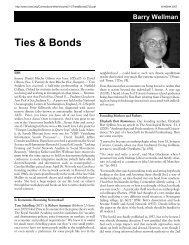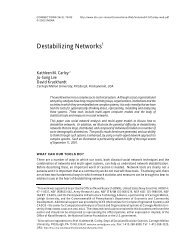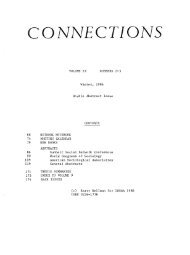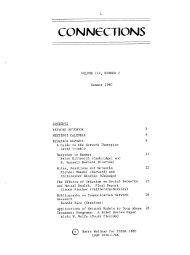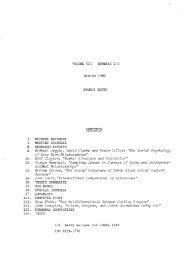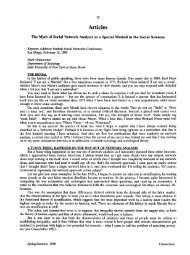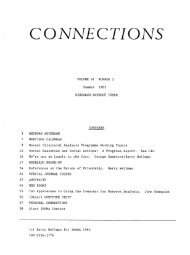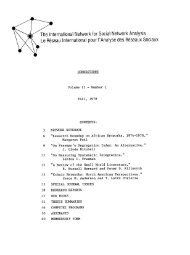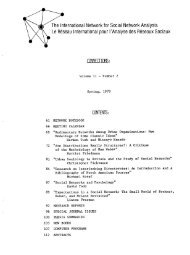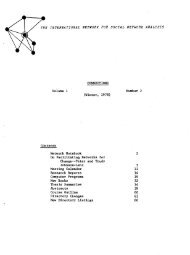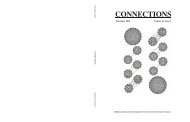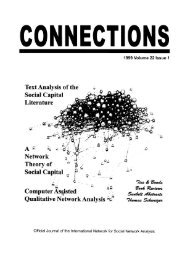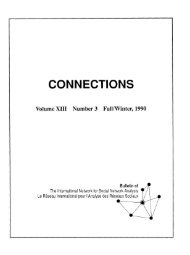Sunbelt XXXI International Network for Social Network ... - INSNA
Sunbelt XXXI International Network for Social Network ... - INSNA
Sunbelt XXXI International Network for Social Network ... - INSNA
Create successful ePaper yourself
Turn your PDF publications into a flip-book with our unique Google optimized e-Paper software.
Snowball Sampling For Online <strong>Social</strong> <strong>Network</strong>ing Sites: Problems And RemediesZhu, Jonathan J.; Zhang, Lun; Yang, Muhan; Liu, Qirong; Lu, Heng; Jiang, JingCollecting <strong>Network</strong> DataSampling, Snowball Technique, Large‐scale <strong>Network</strong>s, Online <strong>Network</strong>s, random walksTHURS.AM1Sampling has remained to be a challenging issue <strong>for</strong> research on social networks. Snowballing is perhaps the only feasible approach in most, if not all, studiesof large‐scale social networks. However, snowball sampling usually results in biased samples. The emerging online social networking sites (SNSs) present notonly new challenges (because of their massive size) but also new hopes (thanks to the advent of in<strong>for</strong>mation retrieval technology). In the current study, weattempt to address two issues that have rarely been empirically studied: First, we will assess the quality (i.e., representativeness) of samples generated fromthe usual snowballing procedure. Second, we will explore several modified snowballing strategies and then test the resulting quality and efficiency of eachstrategy. We will make use of the population data of a large SNS (N > 10 million nodes) to accomplish both objectives. We have already completed the firstobjective, with results confirming the usual criticisms of snowball sampling. We are currently working on the second objective, with some surprising butencouraging results. We expect the final results from the two lines of inquiry will contribute to both theory of and practical solutions to social networksampling.<strong>Social</strong> Capital And Adaptive Capacity In Declining Resource Based CommunitiesOrtiz‐Guerrero, Cesar E.Qualitative and Mixed Method <strong>Network</strong> studies<strong>Social</strong> Capital, Collective Action, Resilience, Adaptive Capacity, Rural CommunitiesFRI.AM1The study of social capital and collective action (Lin, 2007) and other network‐based relational dynamics through which diverse actors develop new governanceinitiatives is an emergent field in planning theory and practice (Albrechts & Mandelbaum, 2005; Hutchinson & Vidal, 2004) AND rural development (Murdoch,2000). However, though there is also a long history of resilience, adaptive capacity and self organization in theoretical ecology and in the management ofresource systems (Berkes & Folke, 1998) our literature search found no sources linking “resource‐based communities AND social capital/collective action ANDadaptive capacity/resilience”. This paper explores the network based relationships between social processes and urban <strong>for</strong>m (Graham and Healey, 1999),through a multidimensional, participatory‐based, qualitative interpretation of decline in the Rainy River District (Ontario). We suggest a SNA approachcombining elements and theoretical frameworks explored in economics, resource and social systems. These centre on resilience, adaptive capacity, socialcapital and collective action in the context of resource‐based communities. This framework will help us to understand change in resource‐based communities,in particular, their relative capacity to (a) to recover/adapt from economic, social and ecological shocks and stresses; (b) to self reorganize and develop newgovernance initiatives; and (c) to plan <strong>for</strong> decline in the context of changing rural regions. This paper is based on the final version of my doctoral dissertation.



